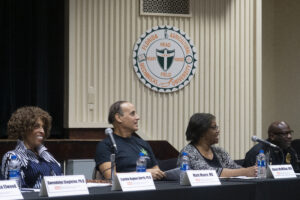
Marijuana is illegal according to federal law.
Students, faculty, staff and members of the community gathered in Perry-Paige Auditorium Tuesday night to learn the lesser known facts of marijuana from a panel of experts.
At the entrance, guests were asked to sign in. Then, they were given a packet with an optional survey, a marijuana fact sheet and a responsible use guide. Attached to the packet was a raffle ticket used as an incentive for guests to stay until the end of the event.
Designed in question-and-answer style, the forum was moderated by Angela Hardiman, public affairs liaison for the Florida A&M University Medical Marijuana Education and Research Initiative. She asked each panelist pre-curated questions through the first half of the event. Each speaker was given a two-minute time limit for their answer.
The first panelist to speak was Mark Moore, a doctor from Medcan, LLC who quickly became the celebrity of the eight-person panel as he engaged audience members with his extensive knowledge on marijuana use and distribution. His words were frank yet relatable.
“Weed is marijuana. Medical marijuana is marijuana,” Moore said. “When you have something produced by a company, they make specific amounts in specific ways. When you buy something on the street, you have no idea what it is.”
Marijuana can bring danger if not accessed and used appropriately, he noted. The highlighted message of the evening was to be cautious. Street marijuana is not regulated.
According to Moore, medical marijuana is mainly distributed by qualified physicians to patients with pain-related or anxiety-related conditions. Marijuana from the street may be synthetic or laced with heroine and other drugs. He encouraged students to beware of purchasing marijuana unlawfully because the goal of most drug dealers is to sell an addictive product to increase sales.
Terence Calloway, chief of the FAMU Police Department, said that marijuana is illegal according to federal law and confirmed that users of both medicinal and recreational versions of cannabis will equally flunk a drug test if a trace is found in their systems.
“It simply states that some states have allowed it to be legalized but, the federal law itself says it is illegal,” Calloway said. “As Dr. Moore said, when you put medical on the term marijuana, it doesn’t change what it is. It’s still marijuana.”
Hardiman announced that marijuana arrests now account for over half of all drug arrests in the United States and of the 8.2 million marijuana arrests between 2001 and 2010, 88 percent were for simply having marijuana. She attributed the American Civil Liberty Union’s original analysis for the information.
“Nationwide, the arrest data revealed one consistent trend – I think we all know what that is — the significant racial bias of it,” Hardiman said. “Despite roughly equal usage rates, Blacks are 3.73 times more likely than whites to be arrested for marijuana.”
Panelist Mutaqee Akbar, owner of Akbar Law Firm, said that he believes the information Hardiman shared to be true. He thinks that a big contributing factor to the high number of marijuana-related arrests is the distinctive smell that the drug carries.
The second half of the event was dedicated to the audience. Guests were given the opportunity to ask the panel questions. Each individual who wanted to talk was prompted to speak into a microphone and direct their question to a panelist. Moore answered most them as they were mainly up his alley.
“The poor doctor, he was so long winded,” Patricia Green-Powell, interim executive director of the MMERI, said jokingly.
The forum was jointly hosted by FAMU’s Student Government Association and the MMERI.
Surgeon General Kimberly Williams and Deputy Surgeon General Chloe Laifaille represented SGA at the forum.
“One of the Office of Surgeon General’s duties is promote health awareness through seminars just like this, so we are thrilled to work with the Medical Marijuana Education and Research Initiative,” Laifaille said.
The turnout was less than expected.
“It was wonderful, I wish we had a lot more students but still, the energy was good,” Green-Powell said. “I think if the weather had not been damp and rainy, we would have had a much larger turnout.
No form of marijuana is permissible on campus.
For more information about the MMERI, visit mmeri.famu.edu